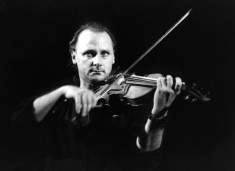
Zoltán Lantos
Maďarsko
Zoltán Lantos patří rozhodně k nejzajímavějším reprezentantům maďarského jazzu.
Tak jako Garbarek čerpá inspiraci z hudby východní Evropy a Coltraine z hudby
africké, Zoltán Lantos vkládá do svého jazzu prvky hudby z rodného Maďarska.
Jeho hudba s tradicí přímo nepracuje, vyrostla však v této kulturní oblasti
a tak je v ní hudební odkaz přítomen. Je to základ, který nabízí pevný bod,
jemuž Lantos vděčí za vzlet ve své jazzové improvizaci. Lantosovy nahrávky,
které mají většinou instrumentální charakter, neparafrázují tradiční melodie. Je
to hudba osobitá a silná, známá po celém světě.
Zoltán Lantos vystudoval hru na housle na Lisztově hudební akademii v Budapešti.
V roce 1985 odjel studovat do Indie klasickou indickou hudbu. Zůstal tam osm
a půl roku: studoval, komponoval a koncertoval. Po svém návratu do Evropy hrál
s mnoha umělci: Márta Sebestyén, László Dés, Mihály Dresch, Kornél Horváth,
Charlie Mariano, Dhafer Youssef, Ramesh Shotam, Renaud Garcia-Fons, Markus
Stockhausen a dalšími. V současné době vystupuje doma a v zahraničí, komponuje
pro divadlo a tanec. Vydal tři CD: "Piesces" (1996), "Eclipse" (1997)
a "Mirrorworld" (1998.
Svou hudební kariéru zahájil v sedmdesátých letech. Byl zakladatelem
a dlouhodobým členem Binder Quintet. Dnes je jeho unikátní a vyspělý hudební
projev rozpoznatelný od první zahrané noty. Později založil vlastní kvartet,
v němž se vystřídala špička maďarského jazzu (Istvan Baló, Róbert Benk, István
Grencsó, Félix Lajkó a mnoho jiných). Nyní je stálým členem souboru, který vede
slavný maďarský free jazzový hudebník Göyrgy Szabados, souboru MAKUZ a také
velmi známého folklórního souboru Csik. Pravidelně vystupuje na bezpočtu
mezinárodních festivalů, pořádá koncerty a jam session.
Zoltan Lantos
Hungary
One of the most indvidual, definitive and exemplary representatives of the
Hungarian jazz world. As Garbarek with the eastern Eurepean, and Coltraine with
the African music traditions, thus he takes elements from Hungary.
His music doesn't work with, it lives on the traditional culture, and
consciously speaks for the heritage hidden there. The folk posture which is
built into his music gives him a foundation, which offers a secure basis from
which he takes flight in jazz and improvization. His recordings which are
primarily instrumental in character, do not simply paraphrase traditional
melodies, but the texts can also be heard. His music is emveloping, personal and
intimate, strenght and faith radiate from it. His work is known the world over.
Zoltán Lantos holds a degree in classical violin from the Ferenc Liszt Academy
of Music in Budapest. Being drawn towards esperimental and eastern music from
early on, he went to India to learn classical Indian music on a scholarship in
1985. He stayed for eight and a half years studying, composing and performing.
Since returning to Europe in 1994, he's been working with various musicians
(Marta Sebestyén, László Dés, Mihály Dresch, Kornél Horváth, Charlie Mariano,
Dhafer Youssef, Ramesh Shotam, Renaud Garcia-Fons, Markus Stockhausen and
others). Dividing his time between touring abroad and performing in his native
Hungary, he also composes for theatre and dance. He has previously released
three CDs, "Piesces" in 1996, "Eclipse" in 1997 and "Mirrorworld" in 1998.
His musical career began in the seventies. He was the founder and for years a
definitive member of the Binder Quintet. His matured individual taste can be
distinguished upon hearing the first note. Later he formed his own quartet, in
which all the major figures in Hungarian free and improvisational jazz have done
a turn (Istvan Baló, Róbert Benkó, István Grencsó, Félix Lajkó and many others).
He is a permanent member of Gyorgy Szabados' the leading Hungarian leader of
free music band, of the MAKUZ ensemble, as well as of the well known Csik (folk
music) Ensemble. He regularly takes part in countless international festivals,
concerts and jam sessions.
